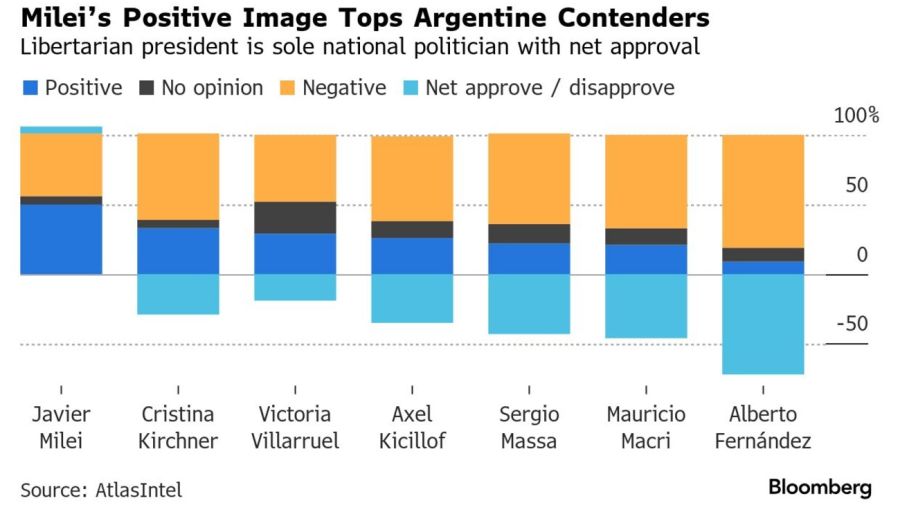Cristina Fernández de Kirchner is back on Argentina’s political scene for the first time since President Javier Milei took office, set to challenge the libertarian and contest power within her own Peronist party in an upcoming local vote.
Fernández de Kirchner, a two-time president and former vice-president, announced her candidacy to represent the most populous section of Buenos Aires Province in September’s legislative elections during a television interview Monday night. While it may seem like a step down for one of Argentina’s biggest power brokers, the result will set the stage for a national midterm vote the next month, in which Milei needs to convince investors Argentines still support his aggressive economic reforms.
“It’s an issue of common sense,” Fernández de Kirchner told local channel C5N. “Does anyone think that if Peronism doesn’t do well in September in provincial elections, in the bastion of Peronism, we can do well in October?”
The province of Buenos Aires is home to about 40 percent of Argentina’s 46 million people and has long been a stronghold of Peronism, the country’s dominant populist movement until Milei’s rise to power. The district in which Fernández de Kirchner is running has been held by the Peronists since 1997, and represents nearly five million Argentines.
Still, Fernández de Kirchner blasted Buenos Aires Province Governor Axel Kicillof for separating the national midterms from the local elections – laying bare the growing tensions within Argentina’s centre-left coalition. “Men don’t do politics the same as women. The man thinks if things aren’t done his way, he loses,” she said, referring to Kicillof’s decision. “If I have to walk back something because I made a mistake, I’ll do it.”

Milei is well positioned for the next round of local elections after his libertarians took first place in a Buenos Aires City municipal vote last month, beating former pro-market president Mauricio Macri’s PRO party on his home turf. Macri’s candidate placed third in the City Hall election, while the Peronist contender surprised by taking second. Macri and Milei have since both pledged to form an alliance in the province to beat back Peronism.
The La Libertad Avanza president remains the most popular figure in Argentina politics, according to the most recent LatAm Pulse survey, a monthly poll conducted by AtlasIntel for Bloomberg News. Half of Argentines hold a positive image of Milei and while Fernández de Kirchner remains the second-most popular politician, only 33 percent see her in a positive light. She’s trailed by Victoria Villarruel, Milei’s estranged vice-president, at 29 percent; Kicillof at 26 percent; Sergio Massa, the former Peronist economy minister who lost to Milei, at 22 percent; Macri at 21 percent; and Alberto Fernández, Milei’s predecessor, at nine percent.
“She has some of the worst approval ratings in the country yet she thinks, as always, she can help Peronism,” said Mariel Fornoni, director of polling firm Management & Fit. “In reality, letting Peronism renew itself is the only way to help.”
Infighting among the Peronists might be the biggest boon for Milei, potentially setting the stage for a much larger political overhaul. Kicillof, who began his second term as governor in December 2023, has long been seen as a presidential hopeful. In a Saturday rally he threw his hat in the ring as the main opposition figure to contest the libertarian’s power. It remains to be seen much leverage he has within the Peronist movement to place his closest allies on the ballot.
“If they’re not unified, a lot of Peronist mayors and governors are going to smell blood,” said Joaquín Bagues, managing director at Buenos Aires brokerage Grit Capital Group.
The fact provincial legislators enjoy some protection from arrest may have been another factor in Fernández de Kirchner’s decision to run. She was sentenced to six years in prison for graft in 2022, but didn’t serve time because she had legal immunity as sitting vice president of Argentina at the time. The country’s Supreme Court has yet to ratify the sentencing decision.
Last month, lawmakers in Congress rejected a bill authored by Milei that would have barred Fernández de Kirchner from running for national office.
related news

Argentina’s state energy firm YPF to sign LNG export deal with Italy's ENI

Newell's Old Boys suspends nine-year-old footballers over photo with Central player

Unity march boosts pensioners' protest against Milei's austerity cuts

Photojournalist seriously injured by police during protest leaves intensive care
by Manuela Tobias, Bloomberg


















Comments